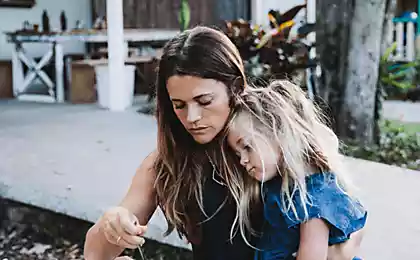191
Summer holidays - 10 lessons of parting with a child
Summer for busy mothers is in many ways a long-awaited opportunity to relax from worries. This season seems to be deliberately designed to build strength for a busy year. But how difficult and disturbing to part with a child for a long time.
Separation difficulties become a real test for some parents, although it is known that sooner or later the children will have to be released completely. Parenting is a hectic occupation, but in some cases the inability to let the child go takes on unhealthy forms. Most often, this happens when children replace the full realization of the mother’s life and fill the void. Anxieties about children obscure the fear of their own loneliness and uselessness.
If this is not the case: there is something to do, but fears do not let go, perhaps you are a hyperprotective parent, used to see the world in a hostile light, where at every step of your baby waiting for danger. You may have experienced a lack of warmth and care as a child and do not want to repeat the mistakes of your family.
Succumbing to all these impulses, we can make mistakes from a completely different area – instill in the child fear of the world around him, deprive him of the opportunity to learn independence, reduce activity and simply limit his joys.
Let’s try to look at the situation with different eyes and learn to let the children go without too much worry.
Lesson one. The fuss and anxiety before the long road, the control you lose and the expectation of bad things are all unconscious feelings, in other words, an unconstructive approach. Making a decision about a trip, you were probably driven by specific goals - in the country at the grandmother's fresh air and vitamins, in the children's camp - communication with peers. Knowing exactly how you benefit from such a decision, you can exhale. This will free up your power to think through the details that need to be discussed with the child and those who will be watching him in your absence.
Lesson two. Without letting go of the child, it is as if we do not trust our own motherhood. It is believed that a good mother should worry (it is not specified how much) and worry. Try to imagine a parent who for months does not remember where the child is and what he does. At the very least, it would be puzzling. But so that experiences don’t overshadow another life, it’s important to praise yourself for it. You are a good mother, you have taken care of everything you need and found the strength to make the right decision.
Lesson three. Becoming a mother, a woman gets a completely new experience. To start living the former carefree life, paying attention only to yourself loved, is almost impossible. But after the first wave of separation sadness passes, you will have time to remember who you are – not as a mother, but as an independent person. Think about what you want, outline plans and dreams for the near future, be with yourself. For a full life, such loneliness is as important as motherhood.
Lesson four. Yes, in the bustle of daily cares, we do not notice much - how our children grow, what changes in them, what new appears. This deprives us of both joy and the right view of education. Parting is an opportunity to see and evaluate changes over time, to review the approach and roles in the family.
Lesson five. Understand how you really love your children Parents are as different as children. We show our feelings in different ways – someone is actively caring, someone is ready to resolve everything, as long as the child is happy. Love can be fanatical, overwhelming or cautious. Separation from children helps to look at themselves from the outside and draw conclusions.
Lesson six. No matter how old your children are, you are still a parent. For many, it means being on top, controlling and following. We do that every day. When control is transferred to other hands, you can relax and choose a different role. Over the phone and Skype in the summer you can chat about nothing, joke and share impressions. Like friends.
Lesson seven. Don't fool yourself and the kids. To reduce anxiety, we are willing to hide it from ourselves and the child, although children are perfectly aware of both anxiety and falsehood. Anyway, the truth is always more useful. If you learn how to explain your feelings, it will establish a trusting relationship and help you communicate more effectively. It’s easier to say that you’re worried and ask your kids to be more careful than to play cool and mislead them.
Lesson eight. Becoming a realist is impossible to control everything. And when, if not in separation from the child, it is best to learn to understand and accept it. It is important to be connected, to help when possible and necessary, but not to go crazy if something fails. Rejoicing and sadness are equal aspects of life and upbringing of children.
Lesson nine. Learning to divide life into stages of experience is too painful if the separation is perceived as a kind of end. In fact, the departure of a child is quite a banal event, if you treat it calmly. You can turn the fees into a pleasant ritual with anticipation of future travel and recreation. And then turn to your own life with the same joy.
Lesson ten. By depriving a child of our society, we can experience it as the fact that we abandon him, stop paying attention, which in everyday life we give little. Therefore, you do not want to let go, and it is unclear how and at the expense of what. Separation helps to realize that everything is in order. Whatever you do for your children, you do it in a way that no one else can, and your children love you for who you are. This is your parental identity.
Source: domashniy.ru/























